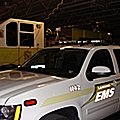- By Dan Veaner
- News
 Print
Print  If you you break a finger or a toe you normally just go to your doctor, or take yourself to the emergency room. But a surprising number of people call 911 even when they don't have a serious or life-threatening emergency. Fire Departments across the nation call these 'alpha calls'. As of last Tuesday Lansing Fire Chief Scott Purcell says the Lansing Fire Department will no longer respond to alpha calls.
If you you break a finger or a toe you normally just go to your doctor, or take yourself to the emergency room. But a surprising number of people call 911 even when they don't have a serious or life-threatening emergency. Fire Departments across the nation call these 'alpha calls'. As of last Tuesday Lansing Fire Chief Scott Purcell says the Lansing Fire Department will no longer respond to alpha calls."People were driving hot with red lights and sirens to an alpha call that was only a broken finger," Purcell says. "People were getting in accidents. We're trying to prevent that."
When somebody dials 911 a dispatcher takes the information about what's wrong. He assigns a code using a system that is used for Emergency Medical Services (EMS) nation-wide. The least serious are coded 'alpha'. They include non-life threatening things like a broken finger or general illness. A 'bravo' call is a car accident with some minor injuries. 'Charlie' is a call where advanced life support is probably going to be needed, but it's not quite life threatening yet. A 'delta' call is serious, like a heart attack. The most serious is an 'echo' call, which may be somebody with cardiac arrest.
"Alpha calls are, in my opinion, are something you shouldn't be calling 911 for," Purcell says. "They're wasting a lot of our resources. When you run a thousand calls, if you can cut 100 off... when an EMT gets out of bed, goes to a call and comes back home you've wasted an hour, so this will save them 100 hours a year."
The numbers bear him out. Last year the Lansing Volunteer Fire Department responded to 1126 total calls. 681 of those were EMS and the remainder were fire and emergency calls. In July alone the fire department responded to 30 fire calls and 58 EMS calls. But Purcell says the numbers are misleading, because many of those fire calls are automobile accidents that involve EMS personnel even though it is counted as a fire call. Purcell estimates that Lansing EMS volunteers actually showed up for about 781 emergency calls last year.
When you call 911 county dispatchers send a call to the fire department, and if volunteers are available they rush to the fire station to get trucks and equipment, or directly to the scene. If nobody responds the incident is deemed a 'no-response' for the department and another emergency responder organization is dispatched.
"Most of our 'no-responses' throughout the year have been alpha calls," Purcell says. "This past month we had 19 'no-responses' and 12 of them were alpha calls."
 Lansing Volunteer Fire Department Chief Scott Purcell
Lansing Volunteer Fire Department Chief Scott PurcellMany of those calls waste volunteers' time, because other responders are also dispatched as a rule. The commercial Bangs Ambulance service responds to these calls, and in Lansing, which no longer has a public ambulance service, can do some things that Lansing EMTs can't do. When both are called it often turns out that only one is really needed. Purcell says an example of that is calls for psychiatric evaluations at the youth detention centers on Auburn Road.
"We get called for a psychiatric evaluation four times a month to the girls school and the boys school," he says. "We get told by Dispatch to await law enforcement. While we're waiting for a Sheriff's Deputy or a State Trouper, Bangs is sitting there waiting with us. So we've just wasted resources by duplicating services."
Approximately a dozen Lansing volunteers are trained EMTs. Three or four respond to EMS calls only, and the rest are cross-trained in fire fighting. The department maintains two fully equipped EMT vehicles, one at Central Station and the other at the Village of Lansing fire station.
That is because at least half the 911 calls are from the Village, even though it only has about a third of the population of the town. Purcell says the reason is that the majority of commercial buildings, the mall, apartments, hotels, and low cost housing are in the Village. Most volunteers live north in the town, outside of the Village. They are subject to State training and certification requirements, just as paid EMTs are. Locally EMT training is available at TC3 in regular semester classes, or at the Fire Academy in Montour Falls, where an intensive training is offered.
Reducing the number of calls those 12 people respond to not only saves resources such as gas and equipment, but may help retain volunteers in a time when it is increasingly more difficult to recruit volunteers for fire departments.
Taking alpha calls off the slate is not just limited to Lansing. Departments across the country have been dropping them. Locally Ithaca and Newfield are among the departments that don't respond to alpha calls. Purcell has been working on eliminating alpha calls all year, but it didn't happen until last Tuesday because County Response officials wanted to work some bugs out of the new 911 radio dispatch system before making the change.
v7i30



